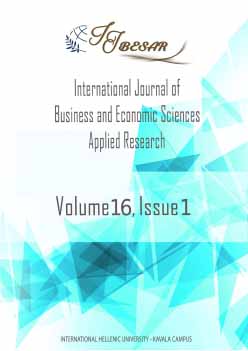Exploring the Intrinsic Factors Influencing Return on Assets: A Case Study of the Hotel Industry in Selected EU Countries
Exploring the Intrinsic Factors Influencing Return on Assets: A Case Study of the Hotel Industry in Selected EU Countries
Author(s): Goran KaranovićSubject(s): Economy, Tourism
Published by: Τεχνολογικό Εκπαιδευτικό Ίδρυμα Ανατολικής Μακεδονίας και Θράκης
Keywords: Intellectual Capital; ERM Structure Practices; Organizational Performance;
Summary/Abstract: Purpose: The main aim of this study was to determine the intrinsic factors (total equity, trade receivable turnover, working capital turnover, long term debt, current ratio, debt to total assets ratio, debt to equity ratio, net sales revenue trend, total operating revenue trend, shareholders' equity trend, cash to total assets, current liabilities to total liabilities) that influence the financial performance of the Hotel Industry in select Central and Eastern European Union countries. Return on Assets (ROA) was used in this study as measure of financial performance. Design/methodology/approach: The paper uses panel data fixed effects model to examine dependent variable ROA as measure of the financial performance of select Tourism and Leisure Industry companies from Central and Eastern EU member states. The intrinsic factors were applied as independent variables. The applied panel data fixed effects model in the study was utilised to determine the impact of the intrinsic factors on financial performance. The data were obtained from EMIS data base. Overall data encompassed 614 companies from select eight Central and Eastern EU member states for the period 2015-2022. Findings: The model performed in this study discovered that intrinsic factors including total equity, trade receivable turnover, current ratio, debt to total assets ratio, as well as cash to total assets had a significant impact on the ROA. Total equity, current ratio, cash to total assets have positive impact as opposed to the trade receivable turnover debt to total asset, while years 2020 and 2021 had negative impact on the ROA. Research limitations/implications: This study was limited just on the select eight central and eastern European Union countries; moreover, the database EMIS used for this study lacks certain variables that are frequently used in similar studies. Result confirmed the importance of intrinsic factors and their influence on the financial performance of the leisure industry. Originality/value: This study contributes to the existing body of theory on financial performance through research on the new practitioners’ perception of the intrinsic factors relative to financial performance. There are very few empirical studies which examine financial performance variables in the Central and Eastern European leisure industry. Consequently, this study aims to bridge the gap between the available literature and body of research.
Journal: International Journal of Business and Economic Sciences Applied Research (IJBESAR)
- Issue Year: 16/2023
- Issue No: 1
- Page Range: 54-61
- Page Count: 8
- Language: English

